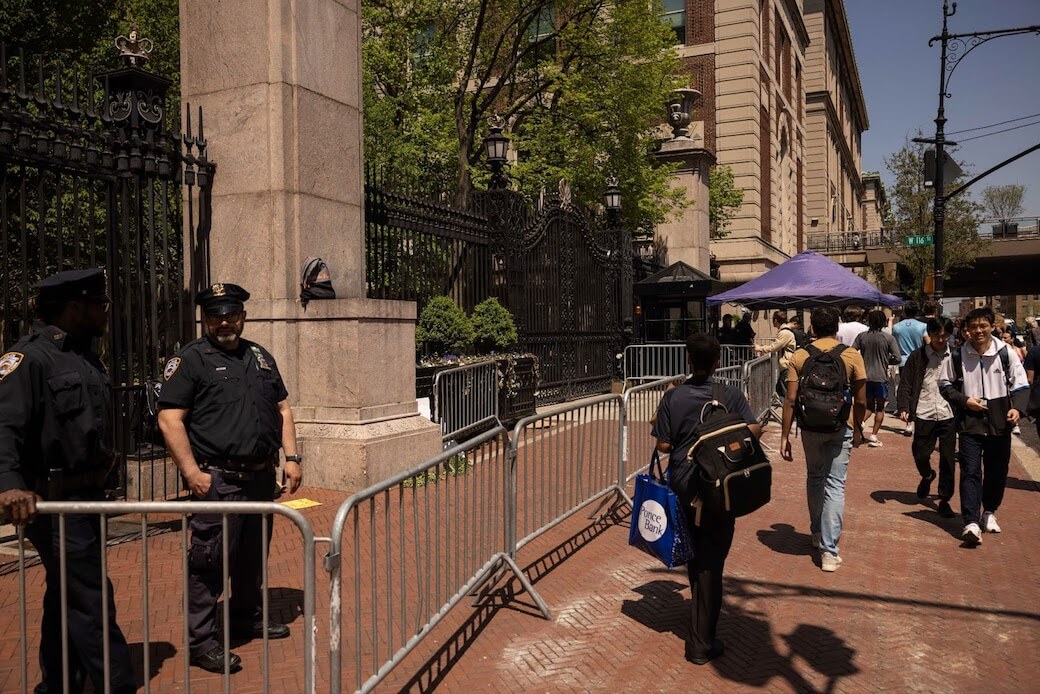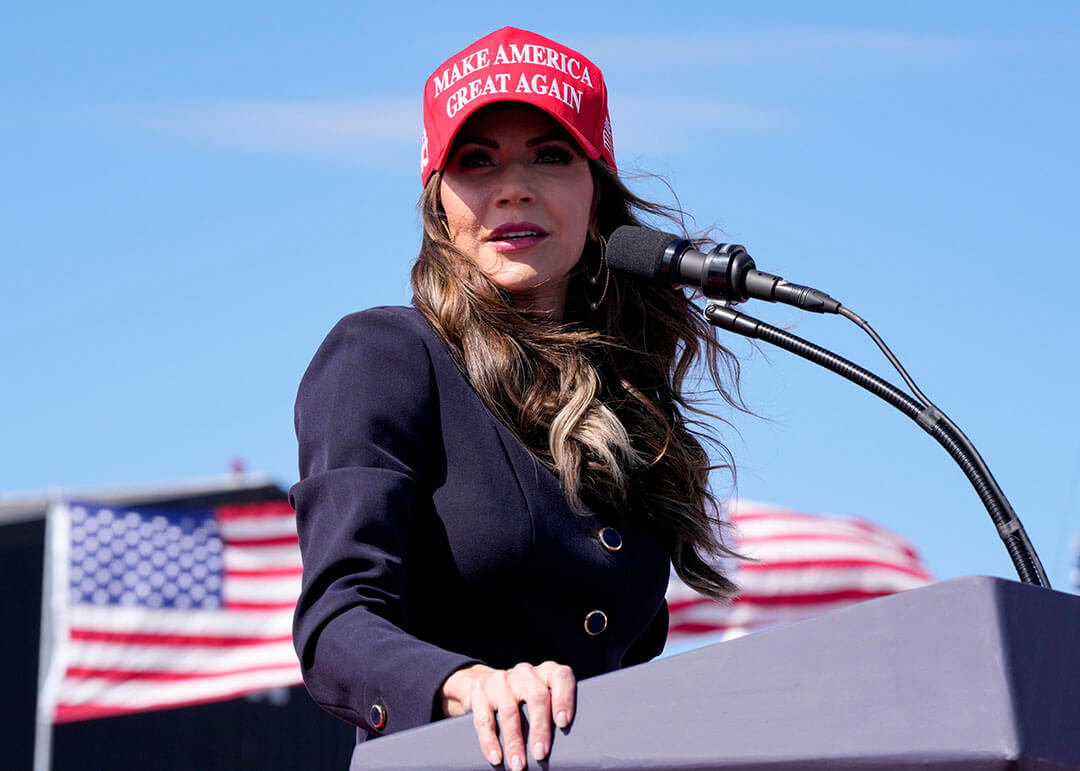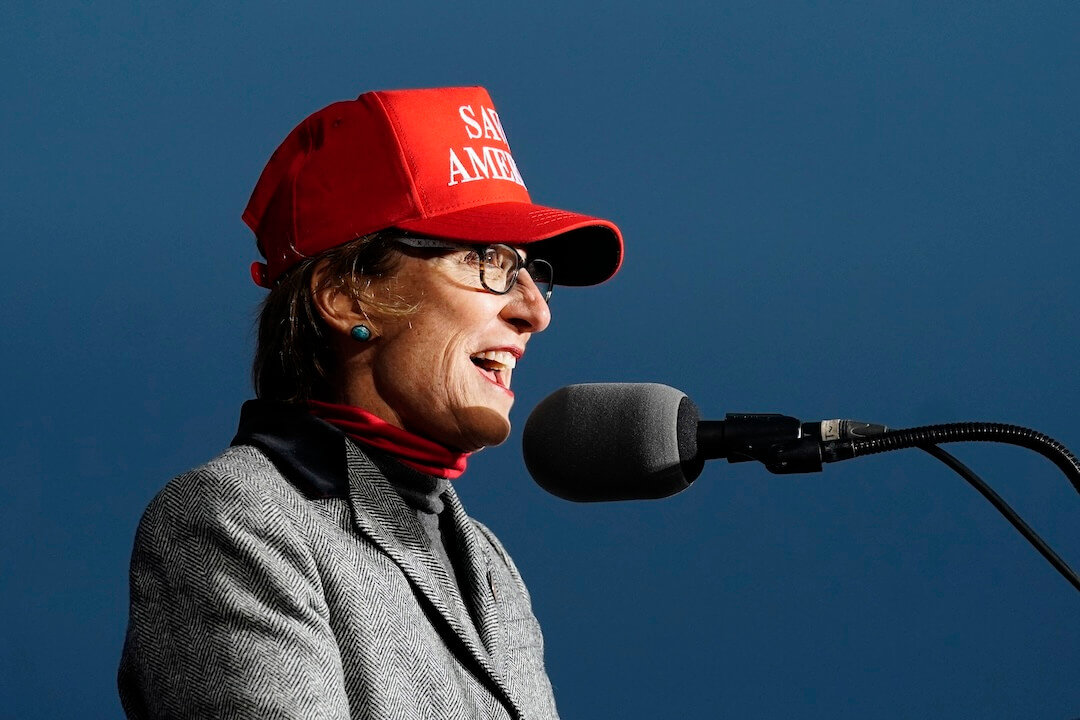This Saturday, one of the biggest media events of the year will take place in Washington, D.C. Celebrities, politicians and media will all cross paths at the annual White House Correspondents’ Association Dinner. This year’s event will be hosted by “Saturday Night Live” star Colin Jost.
While the White House Correspondents’ Association might be best known publicly for putting on this star-studded event, it’s only a fraction of what the WHCA does.
On Wednesday, I had a chance to talk with NBC News White House senior correspondent Kelly O’Donnell, who is president of the WHCA. Here’s our conversation, which has been lightly edited for clarity.
Tom Jones: So, most people know about the White House Correspondents’ Association Dinner. But what else do we need to know about the WHCA? For those non-journalists, and maybe even some journalists, maybe you can explain exactly what you guys do.
Kelly O’Donnell: The White House Correspondents Association advocates for access for the media every single day. Our situation is that we have a large group of journalists who work for different employers and different kinds of media — print, television, radio, digital media, all the different kinds — and so we are an association that brings that together with one voice.
We plan the press coverage for foreign travels. Every time the president goes out of the country, we are organizing where the hotels are going to be for press, how are we getting transportation to the venues, how are we getting credentialing done. We do all of that. We arrange the pools every single day, which are the rotating group of journalists who are always closest to the president. They travel on Air Force One. They go to every event. They travel in the motorcade. We set that up every single day.
We also advocate for things like press conferences. When I know a foreign leader is coming for a visit, when that’s announced, I begin to ask the White House for opportunities for questions. Will we be in the Oval Office? Those kinds of things are done every single day.
TJ: What else?
KO: There is what I would call the H.R. department. We help out with things like workspaces. We manage facility problems. If someone’s light bulb goes out, if a toilet overflows, they call us. And we get White House operations coordinated to take care of that. In most workplaces, you have H.R., you have management, you have those things. We (are that for the White House press).
TJ: You have a very busy and highly competitive job as senior White House correspondent for NBC News. Yet it seems like being president of the WHCA is like a full-time job, too. How much time is spent on your WHCA duties?
KO: It is very much a full-time job, and I knew that going in. So I work all day every day for this year. And I am happy to do it. I planned for it. I want to do it. And I have the benefit that my employer — before I ran for the office — we discussed what it would mean and that there would be needs on certain days where I must take a call from the White House on an issue, I must be meeting with the travel department, I must be going to an advance meeting. This takes me out of my daily routine. And so I partnered with my employer to say, “Are you on board with this? Would you be willing to support it?” And they said absolutely. They believe we should be leaders in the journalism community, and so they have backed me up. That has meant that my colleagues (covering) the White House have shouldered a greater burden while I have done the White House daily duties.
And then that doesn’t even begin to discuss the work of the dinner. Because we don’t have a big staff. We have an executive director and me, and we are planning the dinner. It is an enormous task, the largest, biggest job I have ever tackled. … It’s the ride of a lifetime. (All this) is a great way to serve the journalism community and colleagues. And I think because I have been on the beat a long time and in the business a long time, I am quite comfortable pushing for things that I believe we need to get the job done.
TJ: Is it ever awkward that sometimes you are fighting on behalf of competitors, or even networks or journalists that you might personally not like? Or, at least, dislike the work they or their networks do?
KO: I say this to the White House: There are times when I am Kelly O’Donnell from NBC, and there are times when I’m Kelly O’Donnell from WHCA. And when I am WHCA, I am not a working reporter at that moment. I am the advocate for the entire press corps. And so I have a lot of planning and advance information that I hold that is not mixed in with my reporting side or mixed in with my colleagues in order to have a direct communication with the administration to advocate for all members of our press corps. And members of the press corp who are not members of the WHCA. We advocate for the First Amendment and for journalism. I never have an issue with that. I think it strengthens our position that I put aside anything that is competitive to fight for what I think is the best interest of our collective.
TJ: Do you get pressure from other press members to fight harder for them if, say, they feel as if they aren’t called upon enough in press conferences or that they don’t have the same access that others do?
KO: Oh yes, that is a daily occurrence. There is a customer service aspect to that and I tell our members, “Come and talk to me about these issues.” And I can’t fix them all, but I will advocate where I think we can. I will explain what we are doing to explain those issues. I have many times gone to administration officials to discuss concerns brought to me by reporters. We advocate all the time that they move around the briefing room, call on a variety of journalists, mix it up. Because we think a better product comes out of that. Everyone in town has my phone number and email and they use it.
TJ: This is your fourth administration you’ve covered full-time. Has access changed over the years and, if so, how?
KO: Certainly access has changed over the years, partly because the media is different. In the Bush 43 years, there was still a very pre-social media kind of focus on traditional news organizations. In some ways, that made us have a stronger footprint. The cycle of news was different. Each administration has its own relationship with the media. Some enjoy engaging more than others. Certainly, during the Trump years, that president viewed every act of the office as an opportunity to have the cameras in. He did many, many briefings in the briefing room. The current president doesn’t use the briefing room but takes questions in different rooms around the White House. (He) has some press conferences; we always advocate for more. We believe that serves the president’s interest and our own to have more opportunities to question the president.
TJ: What do you see as the biggest issues the press has in covering the administration, and in terms of what the WHCA does?
KO: We have the complication of a busy world with lots of issues and a campaign year. So there will be demands on the president’s time. We would certainly like more direct engagement with the president when it’s possible. He does take our questions on the rope line going to and from Marine One; sometimes there are some organized press conferences. We would like to see more of that. The biggest challenge is trying to make sure that we have independent, professional journalists in the room when big news events are happening. I think with social media, White Houses like to make their own video and put it out. And they’re free to do that. But we believe someone should be a witness in the room if he is signing the bill or he is meeting with an official — at least for a portion of that event so there is an independent documentation of the events of the White House.
TJ: Finally, this week is your 30th anniversary at NBC News. Does it seem like a minute or has it seemed like 30 years?
KO: Honestly, it went by very fast and I’m incredibly grateful. I can’t even believe the coincidence that this important anniversary and a big career highlight like being president (of the WHCA) lined up. That’s sort of magic.
My thanks to Kelly O’Donnell. And now, on to the rest of today’s newsletter …
Tick tock on TikTok?

(AP Photo/Matt Slocum, File)
President Joe Biden signed the bill Wednesday that would ban TikTok in the U.S. unless it is sold by its Chinese owner, ByteDance.
So what does that mean, exactly?
CNN’s Brian Fung writes ByteDance has 270 days to sell TikTok and that “failure to do so would lead to significant consequences: TikTok would be prohibited from US app stores and from ‘internet hosting services’ that support it.”
But, as The New York Times’ Sapna Maheshwari and David McCabe note, “The measure is likely to face legal challenges, as well as possible resistance from Beijing, which could block the sale or export of the technology. It’s also unclear who has the resources to buy TikTok, since it will carry a hefty price tag. The issue could take months or even years to settle, during which the app would probably continue to function for U.S. consumers.”
The U.S. government is worried TikTok poses a national security threat. They fear the Chinese government could force ByteDance to hand over data that would compromise U.S. users. TikTok said it has not shared U.S. data with the Chinese government and would never do so.
In a video posted on — where else? — TikTok, company CEO Shou Chew said, “Rest assured: We aren’t going anywhere. … We are confident and we will keep fighting for your rights in the courts. The facts and the Constitution are on our side and we expect to prevail.”
The Times wrote, “TikTok’s case will probably lean on the First Amendment, legal experts said. The company is expected to argue that a forced sale could violate its users’ free speech rights because a new owner could change the app’s content policies and reshape what users are able to freely share on the platform.”
Here’s a good explainer video from The Wall Street Journal: “What Banning TikTok in the U.S. Would Look Like.”
Brooke Baldwin opens up about CNN
Former CNN anchor Brooke Baldwin has a new deeply revealing piece in Vanity Fair: “Leaving CNN Was How I Found My Voice.” Baldwin left the network after 13 years in April 2022.
Baldwin wrote about what led to CNN pushing her out. She said it started when the working relationship with her producer began to unravel. Baldwin wrote, “In November 2019, I finally walked into my boss’s office. I told Jeff Zucker, the former president of CNN, that I wanted my producer off my team. I didn’t want him to be punished — just moved to another anchor to start anew. A male colleague had made a similar request with success. My request? Denied. Little did I know, this was the beginning of the end for me.”
Things got worse for Baldwin, she wrote, and she considered walking away from the network. She wrote, “CNN beat me to it. In January 2021, the morning Trump was impeached for a second time, my cell phone rang. It wasn’t my boss — rather, it was my agent. Jeff wanted me out. No explanation. Just out. From that moment on, after I’d spent 13 years at CNN, Jeff never spoke to me again. Neither did my former executive producer, who ended up getting moved to another show for COVID-protocol reasons and then eventually promoted.”
CNN declined to comment.
There’s much, much more to Baldwin’s very personal essay, so I urge you to check it out.
Big get

CBS News’ Norah O’Donnell interviews Pope Francis earlier this week in Rome. (Photo courtesy of CBS News)
On Wednesday evening, the “CBS Evening News” ran a rare interview with Pope Francis. He talked with anchor Norah O’Donnell ahead of the Vatican’s inaugural World Children’s Day. An extended version of the interview will air on Sunday’s “60 Minutes.”
Interviewing the Pope is a big deal.
In its release, CBS News said it’s “the first time a pope has given an in-depth, one-on-one interview to a U.S. broadcast network. It is a first-of-its-kind papal interview for an American television journalist.”
Puck’s Dylan Byers tweeted, “Over the years, I have asked dozens of anchors who they would interview if they could interview anyone. Far and away the most common answer is the Pope. Can’t believe @NorahODonnell / @CBSNews landed this.”
Best writing of the day
Michelle Cottle, who writes about national politics for New York Times Opinion and is a host of the podcast ‘Matter of Opinion,” with a brutal takedown in “The Humbling of Marjorie Taylor Greene.”
Cottle brings out her big sharp pen in writing, “It’s not simply that Ms. Greene has taken such a Putin-pleasing approach to Russia’s war in Ukraine (Ukrainian Nazis? Really?) that the term ‘useful idiot’ feels unavoidable. She has, in very little time, undermined the influence of her party’s entire right flank, driving less unhinged Republicans — most notably the House speaker, Mike Johnson — to brush back her and her ilk like the poo-flinging chaos monkeys they are.”
Cottle adds, “At this point, the most enthusiastic base of support for Ms. Greene’s shenanigans may be the Kremlin. More food for thought, congresswoman: When Russian propagandists start praising your politics and beauty, it’s time to rethink your life choices.”
Meanwhile, Politico’s Adam Wren writes about Greene’s boyfriend — right-wing media personality Brian Glenn in “Meet the Man MAGA America Wakes Up To.”
Media tidbits
- This paints a pretty grim picture of NPR. The New York Times’ Benjamin Mullin and Jeremy W. Peters with “Inside the Crisis at NPR.”
- Meanwhile, The Wall Street Journal’s Alexandra Bruell with “NPR Chief Defends Coverage, Accuses Critics of ‘Bad Faith Distortion’ of Her Views.”
- The Washington Post’s Sarah Ellison with “Trump’s long, strange history with the tabloids.”
- In my lead item, I wrote about how NBC News’ Kelly O’Donnell is president of the White House Correspondents’ Association. She is not the only NBCUniversal News Group correspondent chairing major journalistic organizations. Capitol Hill correspondent Ryan Nobles is this year’s chair of the Radio & Television Correspondents’ Association and CNBC correspondent Emily Wilkins is president of the National Press Club.
- The Athletic’s Andrew Marchand reports that former legendary New England Patriots coach Bill Belichick likely will make regular appearances on the “Monday Night Football” alternate broadcast featuring brothers Petyon and Eli Manning. Typically, guests appear on the so-called ManningCast just once, but Belichick would appear often. Marchand writes that Belichick’s transition from coach to media star will make him millions. In addition to the ManningCast, Belichick also, according to Marchand, will have “a book deal, a potential inside football show and possibly a podcast.” In addition, Pat McAfee, whose daily show runs on ESPN, says he would like to have Belichick on as a regular guest.
Hot type
The Athletic’s Katie Strang writes about the ramifications of a sports franchise leaving a city in “The Arizona Coyotes are gone. Someone please tell ex-owner Alex Meruelo.”
Have feedback or a tip? Email Poynter senior media writer Tom Jones at tjones@poynter.org.
More resources for journalists
- Reporting on the Rise of AI: A RAND-Poynter Masterclass
- Understand U.S. Immigration From the Border to the Heartland — Start any time.
- Get an AI ethics framework for your newsroom. Start here.
- Hiring? Post jobs on The Media Job Board — Powered by Poynter, Editor & Publisher and America’s Newspapers.
The Poynter Report is our daily media newsletter. To have it delivered to your inbox Monday-Friday, sign up here.








Comments